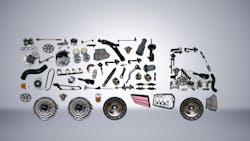Keeping supply chains transparent more important than ever
Delays in new vehicle deliveries. Out-of-stock parts. Shortage of drivers. Repair backlogs. There is no scarcity of bad news in the trucking industry today. Bad news is precisely why having transparency throughout the supply chain is more important than ever.
Don't get me wrong, providing customers with insight into your interactions with them should always be a priority. But with all the challenges fleets and owner-operators are facing today, near real-time accurate information is critical.
However, I suspect it is human nature to want to shield people—including our customers—from bad news. It can be hard to tell a customer that the part they ordered and expected to have delivered tomorrow won’t actually arrive for three days or that the repair that normally takes four days to complete is now going to take six.
See also: Navigating equipment shortages: Fleet and dealer insights
Earlier this year a colleague of mine attended Heavy Duty Aftermarket Dialogue. One of the panels at the event featured fleet maintenance managers who talked about a wide range of issues from the pandemic to supply chain delays to price increases. One thing each of the panelists said was that when it comes to bad news, they want it sooner rather than later. They do not want to be protected from bad news, but rather want help understanding exactly what is going on.
Their thinking went something like this: The sooner they were given the bad news the more options they had for dealing with it. That could mean going to another parts supplier or seeking out another service provider for this one repair. And while no one likes to lose a single sale, you risk jeopardizing your relationship with a customer if you wait until the last minute to share bad news because waiting limits their options.
The reality is, they will appreciate you more for your honesty. Fleets are well aware of current market conditions when it comes to truck and part availability and, since the entire industry is plagued by these shortages, not having a particular part or telling them a repair will take longer is not going to paint you in a bad light. On the other hand, failure to tell your customer the real delivery date at the time they place the part order or the accurate completion date for a repair could irreparably damage your relationship.
We are living in a time when we can provide customers with near-real-time access to the status of a repair or the whereabouts of their parts order. Be transparent with your customers—even if that means you have to share bad news. These days, I don’t think anyone is blaming the messenger.
Gino Fontana, CTP, is COO and EVP at Transervice Logistics Inc. Prior to this recent promotion, he was VP of operations at Berkeley Division and Puerto Rico. He has more than 35 years of experience in the transportation and logistics industry with both operational and sales experience.
About the Author
Gino Fontana
Chief operating officer and executive vice president at Transervice Logistics Inc.
Gino Fontana, CTP, is COO and EVP at Transervice Logistics Inc. His operational expertise emphasizes cost savings, process efficiency and improvement, superior quality, and people management skills. He has more than 35 years of experience in the transportation and logistics industry with both operational and sales experience.
